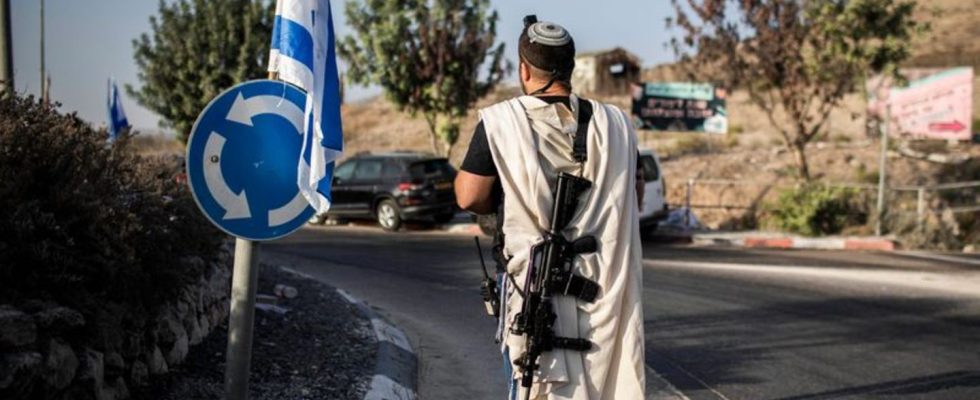Middle East
EU imposes sanctions against Israeli settlers for the first time
A right-wing Israeli settler carries a gun near the Palestinian West Bank city of Nablus (archive photo). The EU is imposing sanctions for the first time because of violence by radical Israeli settlers. photo
© Ilia Yefimovich/dpa
Violent acts by radical Israeli settlers are seen as an obstacle to efforts to find a long-term peace solution in the Middle East conflict. The EU is now sending a clear signal.
Sanctions are now being imposed on four men who are accused of torture, humiliation or violations of property rights, for example, according to the EU Official Journal. The radical youth group Hilltop Youth and a right-wing radical Jewish racist group called Lehava are also affected.
Symbolically important step
Attacks against Palestinians, like settlement construction in the West Bank, are seen as one of the obstacles to efforts to find a long-term peace solution in the Middle East conflict – especially after the Hamas massacre in Israel on October 7th. The EU has repeatedly condemned the acts of violence and the construction of settlements – but to date there has never been the necessary consensus for punitive measures.
The sanction decision is therefore seen as a sign of a change of course in the EU’s Israel policy – even if the punitive measures themselves have comparatively little impact on those affected. Ideally, according to diplomats, they should lead to the Israeli judiciary becoming more committed to prosecuting violence by Israeli settlers against Palestinian villages and olive groves.
Calls for violence – not just against Palestinians
Hilltop Youth is described in the EU Official Journal as a group made up of members known for acts of violence against Palestinians and their villages in the West Bank. The EU justifies the punitive measures against Lehava by saying, among other things, that she uses violence and incites violence against Palestinians, Christians and Messianic Jews. Lehava members, for example, sang “Death to the Arabs” and called for people to take up arms at rallies.
Lehava also organizes violent protests against Jewish-Muslim weddings and the LGBTQI community. Lehava members harassed and attacked Arab-Jewish couples. Those affected include Hilltop Youth members such as settler activist Elisha Yered and a man named Neria Ben Pazi. The latter is said to have set up four of the most violent outposts in the West Bank in 2019.
Hungary avoids long sanctions
The sanctions against settlers should actually have been decided a long time ago. However, the Hungarian government, which is considered particularly Israel-friendly in the EU, only signaled last month that it would no longer stand in their way. Part of the agreement was that there would also be new punitive measures against armed Islamist groups. They had already been imposed last week – in particular because of the use of “systematic and widespread sexual and gender-based violence”.
The sanctions were imposed using the EU sanctions instrument to punish serious human rights violations. People who are affected are no longer allowed to enter the EU or do business with EU citizens. In addition, accounts and other assets held by those affected in the EU must be frozen.
With the sanctions, the EU is following the example of the USA. They have already imposed punitive measures aimed at extremist Israeli settlers. The US government also reimposed sanctions over violence by radical Israeli settlers against Palestinians. This was announced by the Treasury Department in Washington. The sanctions are aimed at two organizations that are said to have provided financial support to two already sanctioned extremist settlers. The men are “responsible for the destruction of property, attacks on civilians and violence against Palestinians,” said Deputy Finance Minister Wally Adeyemo. “Such actions undermine peace, security and stability in the West Bank.”
UN: Settlements obstacle to peace settlement
Only last week, the UN High Commissioner for Human Rights, Volker Türk, again described developments in the area as extremely worrying. In the West Bank, Palestinians are constantly attacked by hundreds of Israeli settlers, who are often supported by the military, he said. After the killing of a 14-year-old Israeli from a settler family, four Palestinians, including a child, were killed in acts of revenge. As an occupying power, Israel is obliged to protect Palestinians from settler attacks and unlawful violence by security forces, said Türk.
One reason for the tense situation in the West Bank is that Israel has been expanding disputed settlements there since it conquered the area in the Six-Day War in 1967. The number of settlers in the area that lies between Israel’s heartland and Jordan has now risen to around half a million. Including East Jerusalem there are even 700,000. The settlers live among around three million Palestinians.
The United Nations has classified these settlements as a major obstacle to a peace settlement because they leave little contiguous territory for the Palestinians in a possible two-state solution. Another reason for the tense situation is the Israeli army’s raids on West Bank cities due to attacks by Palestinians on Israelis.

